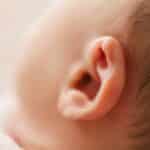As you stumble, albeit elegantly down the road of motherhood, you’ll begin to realize that raising a child is not an easy path to walk.
Don’t get me wrong you will very quickly become in tune with your child and the different problems that they might face. Each cry has a different meaning, poop changes color and there is a pretty good chance that they will vomit on you at least once.
Another common problem that the vast majority of babies suffer from is spit-up and this can be concerning for parents to begin with.
Babies generally spit up milk after burping but this is a reflex action and can happen without the burping process. Sometimes the spit-up may come out of your baby’s mouth and nose.
But is this something that you should be concerned about? Let’s get the low down on spit-up in babies and find out.
Is It Normal For An Infant To Spit Up Through Their Nose?
For a newborn baby, spitting up is common. This is because they do not yet know how to feed correctly, and they often end up gulping down lots of air with their feed.
So when you then try to burp your baby it is understandable that a little milk is also going to get thrown up.
Spitting up is based on a reflex, very much like sneezing, so your baby has hardly any control over how fast or from where the spit up will appear.
The nose and throat are connected internally somewhere close to the roof of the mouth. So if any spit-up comes up quickly, it could easily enter the nose through the connection in the mouth and come out that way.
Why Do Babies Spit Up through Their Nose?
The most likely cause is that your baby is still getting to grips with the finer points and technique of feeding. Almost half of young babies spit up regularly and the peak age for this is around 4 months old. This spitting up is also known as reflux.
Babies will often feed quickly if they are very hungry, but this means that they often take in air along with their milk. This air then needs to escape and it pulls the milk along with it. This can then show up in either the mouth or the baby’s nose.
View in gallery
Some babies really like to eat and often just get overfilled and this leads to an overflow – which is seen as spitting up.
The digestive system of a newborn is also underdeveloped. Meaning that the valve between the esophagus and the stomach is not quite strong enough to hold back all the stomach content.
So when your baby consumes large quantities of milk or formula, the excess milk along with air comes back to the surface and emerges through either the mouth or nose.
Differences Between Spit Up And Vomit
Spitting up and vomiting often get confused by parents as both often come out through both the mouth and nose.
The best way to tell them apart is to look at your baby. Vomiting is forceful as it is caused by the stomach muscles contracting and ejecting pushing the food outside.
This may be uncomfortable and upsetting for your baby and they will often cry as a result. While on the other hand spitting up is a reflex action.
It happens on its own and once your baby spits up they will be more relaxed and feel more comfortable.
How Does It Affect A Baby?
To be honest for the most part the quantity of milk that your baby spits up is very small. And even if it does come out through the nose it only consists of milk and air so it will not cause any pain or damage to your baby’s nose.
But if your baby is spitting up larger quantities of milk then it is worth seeking medical advice as there is a chance that they are not getting as much nourishment as you think.
View in gallery
How To Reduce Spit Up
There are a few ways that you can help to reduce spit-ups in your baby.
1. Check the bottle nipple
If you are feeding your baby with a bottle, you should ensure that the nipple you are using is not too fast flowing for your baby.
By this, I mean that it is not letting too much milk out at a time. this will then also ensure that your baby is not gulping and taking in large quantities of air while they are swallowing.
2. Limit feeding time
If your baby is being breastfed then you can try to shorten the length of each feed. Feeding short and more often could reduce the instances of spit-up.
3. Do not overfeed
If you overfeed your baby it is going to increase the frequency of spit-ups as the digestive system and stomach muscles are all still developing.
Your pediatrician can advise you on the quantity and frequency of feeds in order to try to limit the number of spit ups.
4. No tight clothing
Putting on a diaper or wearing tight clothing right after a feed is finished can put undue pressure on your baby’s stomach. After feeding you could wrap him in a blanket or just ensure that clothing is loose and allows his stomach to expand freely.
5. Burp after feeding
Young babies can not burp by themselves. This is due to a lack of muscle control that is required to burp. By ensuring that your baby is burped after every feed will reduce the chances of spit ups emerging later on.
6. Sleeping position
Spitting up can sometimes cause your baby to choke. The chance of this happening can be reduced by laying your baby on their back to sleep.
View in gallery
7. Keep an upright position
Try to keep your baby upright throughout their feeds and for a while after. This will allow the milk to enter the stomach easily with the assistance of gravity and also reduce the chance of spit-up.
8. Distraction-free environment
Try to maintain a calm and peaceful atmosphere for your baby to feed in. Make sure that there is no loud music or other noisy activities going on around them.
This means that they will feed properly and there is less chance of the excess air being taken in.
9. Feed on time
Avoid delaying feeds as this can make your baby excessively hungry and this is when they are more likely to gulp down their food, taking in excess air at the same time, which can result in spit-ups.
When Do Infants Stop Spitting Up
The frequency of spitting-up will start to reduce by itself around six months of age or after they learn to sit. But for some, it may continue up until one year old.
When To Consult A Doctor
Spitting up for the most part is not a problem. But you may want to contact your doctor if your baby is showing any of the signs below:
- Still spitting up as your baby approaches one year old.
- Your baby has a tendency to choke or cough when he spits up
- Spitting up through the nose happens regularly.
- The spit-up contains any unusual colors or blood.
- Your baby is spitting up a lot and not gaining weight as expected.
- Your baby can not suck or swallow milk properly.
- Your baby cries after each episode of spitting up.
The Final Thought
Seeing your baby spitting up especially when it comes out through their nose can be worrying. But there is no need to be highly concerned as this condition will lessen and eventually disappear over time.
To lessen the instances of spit-up ensure that you burp your baby after every feed and follow the helpful tips to reduce spit-up. Soon enough his digestive system and muscles will be fully developed and spit-ups will be a thing of the past.






